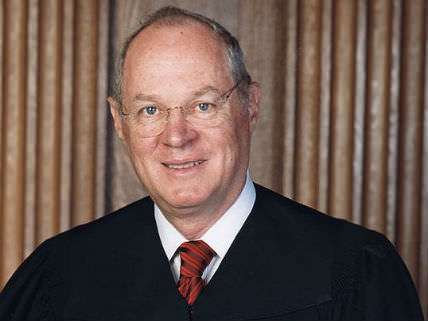Is Justice Kennedy 'Libertarian' When He Agrees With Justice Ginsburg and 'Paternalistic' When He Doesn't?

New York Times legal writer Adam Liptak reports that Justice Ruth Bader Ginsburg "sees an inconsistency" between the Supreme Court's "gay rights rulings" and its "cases involving gender." In the former cases, says Liptak, "the court uses the soaring language of 'equal dignity' and has endorsed the fundamental values of 'liberty and equality.'" But in the latter cases, according to Ginsburg, "the court has never fully embraced 'the ability of women to decide for themselves what their destiny will be.'" The main explanation for the inconsistency, Liptak says, seems to be Justice Anthony Kennedy, who tends to provide the fifth vote in closely divided decisions. Liptak writes that "legal scholars say his jurisprudence is marked by both libertarian and paternalistic impulses, ones that have bolstered gay rights and dealt setbacks to women's groups."
Although I am not exactly eager to defend Kennedy's libertarian consistency, this analysis seems wrongheaded to me. In the gay rights cases to which Liptak refers, the Court struck down a Colorado constitutional amendment forbidding local bans on discrimination against homosexuals (Romer v. Evans, 1996), a Texas law criminalizing sodomy (Lawrence v. Texas, 2003), and a federal law barring recognition of state-sanctioned gay marriages (U.S. v. Windsor, 2013). All three of these decisions involved challenges to state actions (although the Colorado case indirectly involved private discrimination as well). By contrast, the "cases involving gender" mentioned by Liptak dealt with "equal pay, medical leave, abortion and contraception." The Court upheld a government restriction on individual freedom in one of those rulings: Gonzales v. Carhart, the 2007 decision deeming the Partial Birth Abortion Ban Act constitutional. In the other three "gender" decisions, the Court rejected government restrictions on individual freedom. So in what sense does the latter set of cases illustrate the impact of Kennedy's "paternalistic" impulses, as opposed to his "libertarian" impulses?
Why is it "paternalistic," for example, to say the Religious Freedom Restoration Act bars the Obama administration from forcing employers to provide health insurance that covers forms of birth control to which they object on religious grounds? Whether or not the Court's reading of the statute is correct, the result is, if anything, libertarian, freeing some people from one aspect of an unjustified legal mandate (albeit for reasons that are arguably troubling).
A clue to this puzzle can be found in Ginsburg's claim (paraphrased by Liptak) that "the court's five-justice conservative majority, all men, [does] not understand the challenges women face in achieving authentic equality." In Ginsburg's view, "authentic" equality requires more than equal treatment under the law; it requires the forcible reallocation of private resources to pay for demands such as contraception, higher pay, and maternity leave. This vision can be described in various ways, but "libertarian" is not one of them.


Show Comments (46)